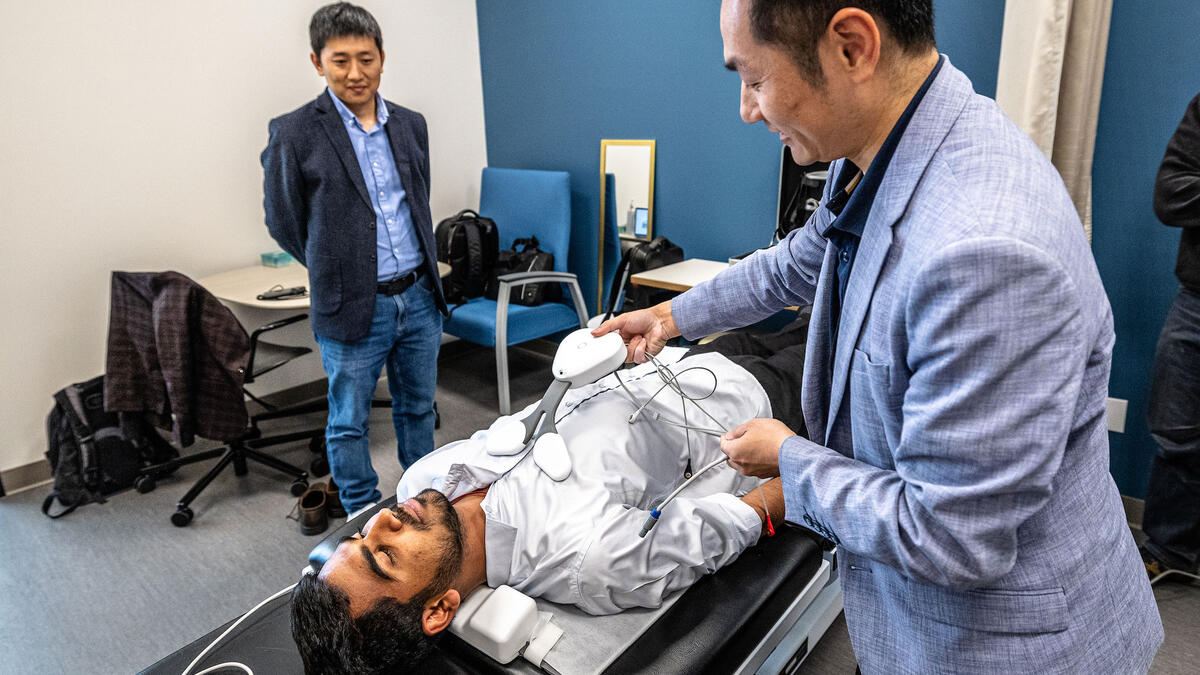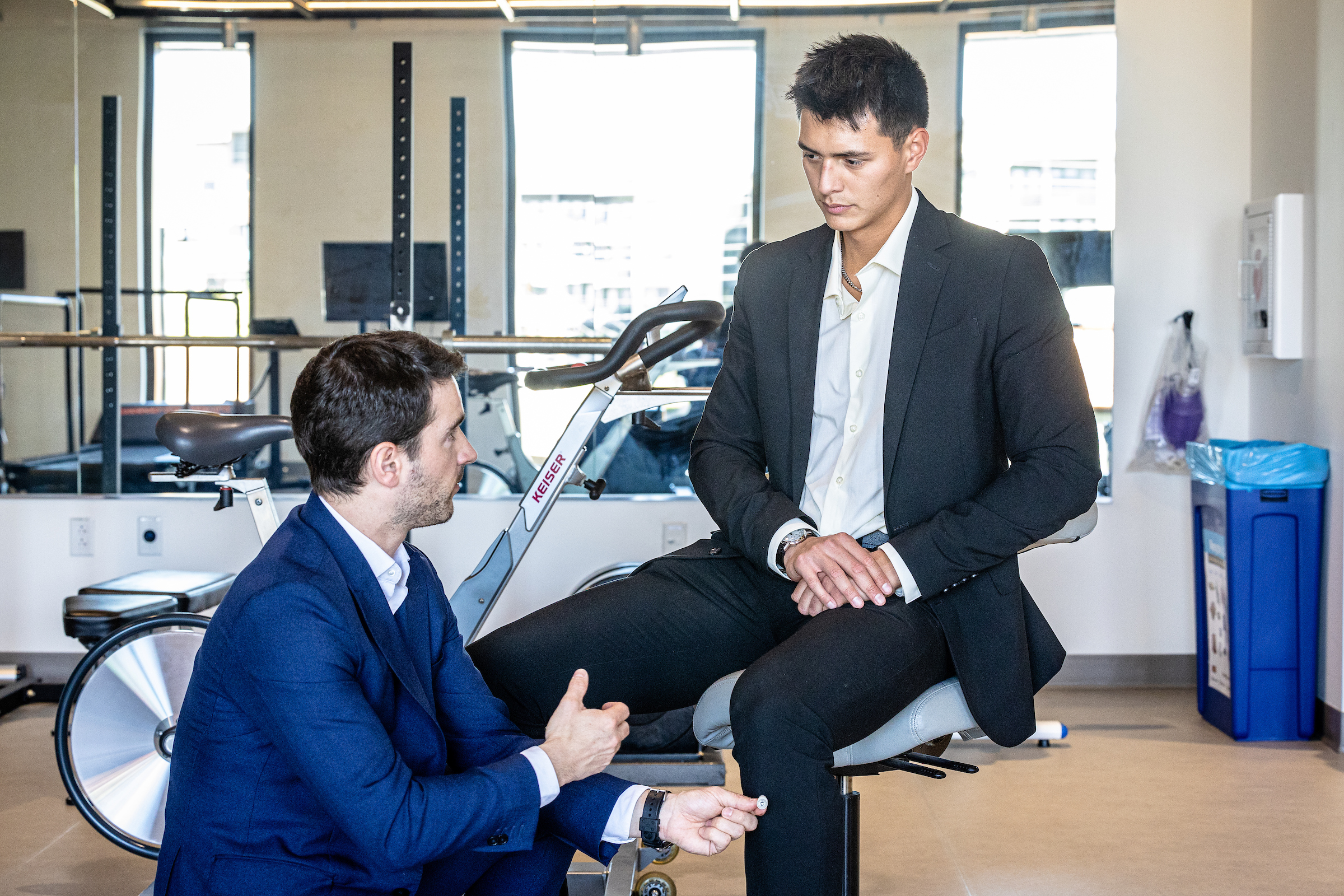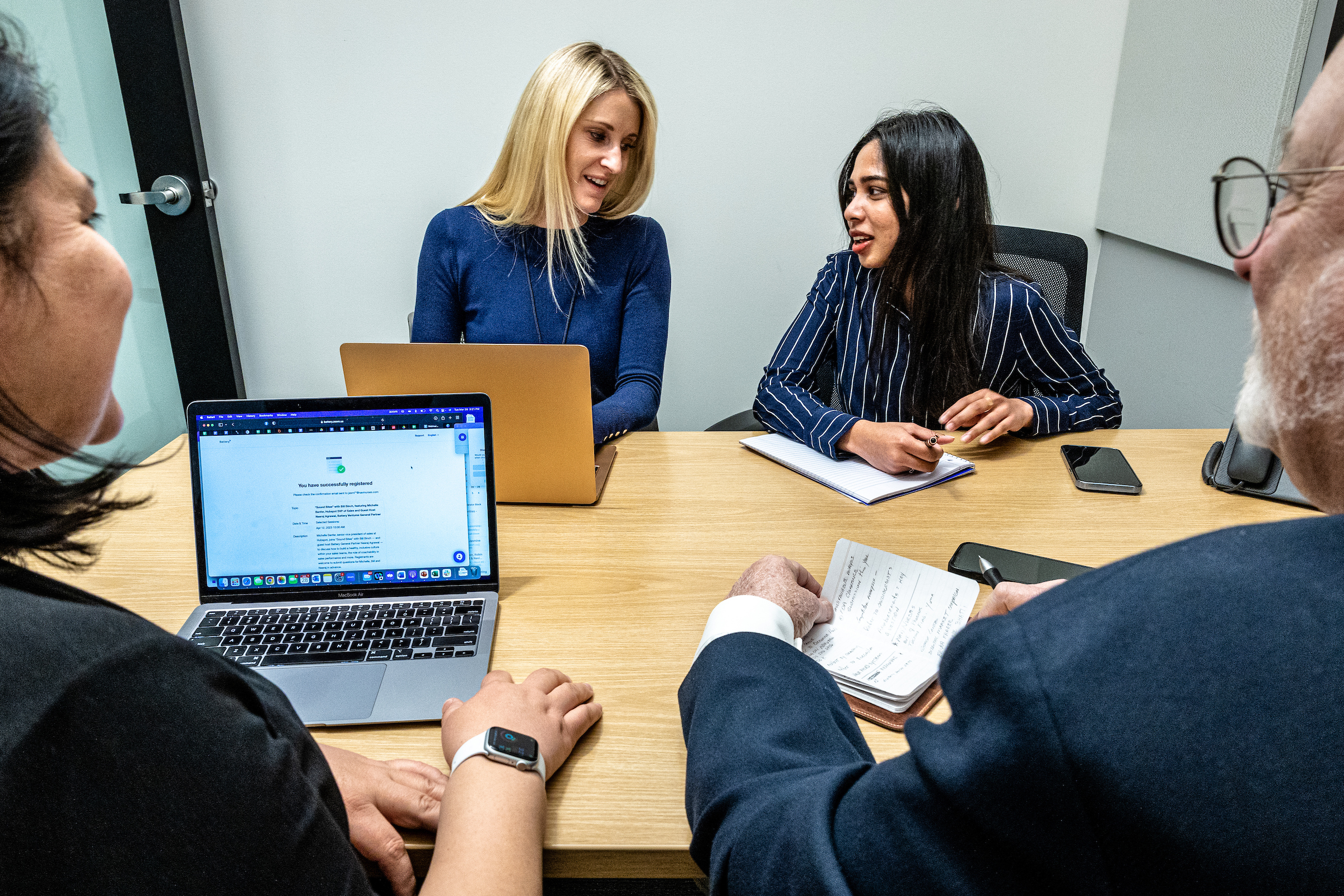Hugo Dominguez will soon move his family from Spain to Phoenix so they can be with him as he attempts to get his medical instrument company, Abanza Tecnomed, established in the United States.
He’ll need to hire, and he already has someone in mind.
It’s the Arizona State University student, a senior in the Edson College of Nursing and Health Innovation, who has been shadowing Dominguez the last two weeks as part of the ASU and Mayo Clinic MedTech Accelerator program. The accelarator pairs students to serve as interns with medical instrument companies from around the world.
For Ryan Ellazar, it's the key to a coming job offer.
“I would say he’s in the pole position for an eventual hiring,” Dominguez said.
Potential job opportunities are just one of the benefits of the accelerator program, now in its fourth year. The program, which is part of the partnership between ASU and the Mayo Clinic, is a win-win for the companies that participate and the students, most of whom come from the Edson College or the College of Health Solutions.
This year, 11 interns – five graduate and six undergraduate – have gotten the chance to help companies scale to market and, at the same time, bring their future careers into clearer focus.
“Our incredible student interns are not just an asset, but they have become an essential component to the success of our program,” said Dr. Steven Lester, founder and chief medical officer of the MedTech Accelerator program. “The interns bring new energy, knowledge and creative problem-solving skills they have developed during their studies to our portfolio companies. And, by working alongside experienced professionals, these young talents are able to gain real-world experience.”
Abanza Tecnomed co-founder and CEO Juan Abascal (left) talks with intern and fourth-year Edson College of Nursing and Health Innovation student Ryan Ellazar about the company's ACL implantable fixation device, designed to securely attach the ACL to the tibia, as part of the 2023 MedTech Accelerator program. Photo by Charlie Leight/ASU News
Here's how the program works: Companies, many of them from outside the U.S., pay to take part in the year-long immersion, which includes a two-week in-person program. During those two weeks, they discuss their products with doctors, medical researchers and business representatives from Mayo Clinic, in an attempt to get a foothold in the country.
The 2023 program, which ended March 30 with the product pitches, included companies from Spain, France, England, South Korea and Africa.
Assigning interns to each company is a matter of trying to find a “good fit,” according to Rick Hall, assistant dean and clinical professor with ASU’s Edson College and co-managing partner of the MedTech Accelerator.
“We bring in really high-level students,” Hall said. “Some of them want to go into medical school or become nurse practitioners, but all of them are really interested in entrepreneurship and innovation as well.”
Hall said both the interns and the companies they work with understand job offers are not required or even expected. But the experience does look good on a resume.
“They not only have a reference from us, but now they have a reference and letter of recommendation from the companies,” he said. “We had one student from three years ago who applied for eight medical schools around the country and got into all eight.
“He came back and told us that when he was in his medical school interviews, all of them said, ‘Tell us about this MedTech Accelerator program you were a part of.’ Because it’s unique, it’s different, and they don’t see that anywhere else.”
Erika Frazer (top left), with Navi Nurses, talks with intern Aparanjini Samanthula, a graduate student in information technology, about the private nursing company as part of the 2023 MedTech Accelerator program. Navi Nurses founder Jasmine Bhatti (far left) and Thunderbird at ASU Clinical Associate Professor Gary Gibbons add to the discussion. Photo by Charlie Leight/ASU News
Arianna Lopez, a senior in the Edson College, has been embedded with Mediwhale, a South Korean company that has developed a retina scan with artificial intelligence solutions to predict cardiovascular, kidney and eye diseases.
Her internship has been, well, eye-opening.
“It’s been a really valuable learning experience for me,” Lopez said. “I’ve learned medical terms and technology terms through the company, and through our business meetings I’ve been able to get that hands-on experience, learning things I otherwise wouldn’t have learned in a classroom.”
Lopez said the internship has even changed her career goals.
“Since I’m a community health major, I was interested in public health,” she said. “But I’ve never had a background in business, and I think this has taught me more in two weeks than I probably ever have had before. So, it’s exposed me to that world, and it’s sparked an interest in me. Now, I’m thinking about what I can do to work on medical devices that may want to enter the market or provide a solution for patients.”
Ashley Hung’s internship with Memory Lane Games, an England-based company that has developed an app to turn memories into games for patients suffering from cognitive decline, is a perfect example of how the program benefits both students and the companies they’re helping.
Bruce Elliott, co-founder and CEO of Memory Lane Games, said he had little idea of how to navigate the U.S. medical system or market his product here.
Hung, a sophomore nursing major at the Edson College, has helped him with administrative work, but also provided him with information about Medicare Advantage or other medical companies he’s met with.
Hung even schooled Elliott on the advantages of using the social-media platform TikTok.
“I asked her, ‘So, do you know anything about TikTok?’” Elliott said. “She said, ‘I know everything.’
“What’s interesting to me is that the hashtag dementia has had more than two billion views on TikTok. So, I asked her how I can get a piece of that, and she’s drafting up some notes for me.”
Elijah Hamstra, a sophomore with a double major in biomedical sciences and supply chain management, has had his knowledge expanded thanks to his internship with Zuri Health, a company that operates in seven African countries and seeks to provide telehealth care to Africans, 65% of which don’t have access to smartphones or the internet.
“This has offered me the chance to grow a lot on how to contact new people, how to find new scheduling opportunities and make new connections,” Hamstra said. “There’s definitely been a lot of opportunity for me, meeting with prestigious doctors and learning about their medical experience and how that’s influenced them. It’s kind of been cool for me to kind of see where they are, what they are doing, and it makes me want to kind of be in their position.”
Hall calls the program “unique.”
After two weeks in which he got a crash course on U.S. medical care, Memory Lane Games CEO Elliott wholeheartedly agrees.
“We had not talked or prioritized the U.S. health-care market because it wasn’t something that we were experienced with,” Elliott said. “But I can tell you we came in with a big vision, and now that vision is 10 times as big.
“The teams from Arizona State University and Mayo Clinic have gotten behind us, and our intern Ashley was instrumental in helping us. It’s just been really tremendous.”
Top photo: Shawn Zhuang, of the company CardioStory, demonstrates the company's non-invasive, highly accurate cardiac pressure measuring and monitoring device on intern Ramkeerthan Konda, a graduate student in innovation and venture development, while Zhuang's company partner, Junhao Hu (left) observes, on March 28, at the 850 PBC in downtown Phoenix, as part of the ASU and Mayo Clinic MedTech Accelerator program. Photo by Charlie Leight/ASU News
More Science and technology

ASU water polo player defends the goal — and our data
Marie Rudasics is the last line of defense.Six players advance across the pool with a single objective in mind: making sure that yellow hydrogrip ball finds its way into the net. Rudasics, goalkeeper…

Diagnosing data corruption
You are in your doctor’s office for your annual physical and you notice the change. This year, your doctor no longer has your health history in five-inch stack of paperwork fastened together with…
Large-scale study reveals true impact of ASU VR lab on science education
Students at Arizona State University love the Dreamscape Learn virtual reality biology experiences, and the intense engagement it creates is leading to higher grades and more persistence for biology…




